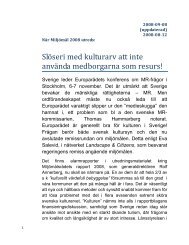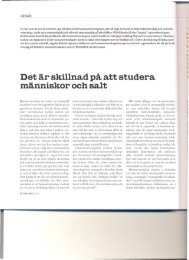Landscape through literature Le paysage à travers la littérature
Landscape through literature Le paysage à travers la littérature
Landscape through literature Le paysage à travers la littérature
You also want an ePaper? Increase the reach of your titles
YUMPU automatically turns print PDFs into web optimized ePapers that Google loves.
78<br />
S L O V E N I A / S L O V E N I E<br />
Ivan CANKAR (1876-1918)<br />
Naš Laz<br />
Tudi mi smo imeli svoj <strong>la</strong>z.<br />
Tam v samotnih, zapuščenih notranjskih hribih, med<br />
pustimi, h<strong>la</strong>dnimi globelmi in zasekami samujejo kotlinice<br />
– <strong>la</strong>zi. Na dnu teh kotlinic je košček obde<strong>la</strong>ne zemlje,<br />
ki je po navadi ograjen z bodičevjem in kamenjem. Tam<br />
kje raste oreh ali temna tepka, drugače pa vsepovsod<br />
krivenčasto grmičevje, nizka, siromašna trava in osat.<br />
Posuti so <strong>la</strong>zi z belim, drobnim kamenjem, ki se je prikotalilo<br />
bog vedi od kod – morda se je bilo ob hudi uri<br />
z neba samega vsulo.<br />
Tista ped obde<strong>la</strong>ne zemlje rodi nekaj krompirja, fižo<strong>la</strong><br />
in graha; ves pridelek bi <strong>la</strong>hko ženska spravi<strong>la</strong> z dvokolnico<br />
ali celo z jerbasom, pa bi ji še teden dni ne bilo<br />
treba hoditi. Zakaj <strong>la</strong>zi so polje gostačev in najubožnejših<br />
bajtarjev, ki si niti lehe na močvirju ne morejo najeti. In<br />
prav zato, mislim, ker so njih edini delež pod soncem,<br />
ljubijo svoje <strong>la</strong>ze bolj globoko in prisrčno, nego kralj<br />
svoje kraljestvo.<br />
Z najmočnejšimi koreninami se ovija srca ljubezen do<br />
grude. Človeku, po svetu pognanem, iz zemlje izruvanem,<br />
se toži najpoprej po koči, po njivah, po senožeti,<br />
celo po siromašnem <strong>la</strong>zu, nato šele po materi, sestrah<br />
in bratih. V nas vseh se pretaka kmečka kri in v tej krvi<br />
ljubezen do zemlje, koprnenje po zemlji. Veliko sem<br />
dosegel spoznanja – dal bi vse to spoznanje in vso<br />
modrost za ozko leho pod brdom, za ponižen vrt kraj<br />
hiše. Amerikanec, ki se je po dolgih letih vrnil v domovino,<br />
iz katere ga je bi<strong>la</strong> pregna<strong>la</strong> krušna skrb, ali pa<br />
prepodi<strong>la</strong> trda pest davkov in drugih nadlog, si ustanovi<br />
najprej svojo domačijo, najrajši blizu prodane ali<br />
porušene domačije svojih očetov. Grenko je slovo od<br />
žene, grenkejše slovo od matere; slovo od očetne grude<br />
pa trga srce iz prs, sili solze v oko moža, ki nikoli ni jokal.<br />
Our plot<br />
We too had our plot of <strong>la</strong>nd.<br />
There in the lonely, deserted hills of Notranjska, among<br />
the bare cold clefts and gulleys, lie iso<strong>la</strong>ted hollows. At<br />
the bottom of these hollows is a patch of cultivated earth,<br />
usually fenced with stones and thornbushes. Here and<br />
there grows a walnut tree or a dark-leaved peartree;<br />
everywhere else twistled bushes, poor short grass and<br />
thistles. The plots are strewn with tiny white stones which<br />
have rolled from God knows where – perhaps during<br />
some storm they dropped from the sky itself.<br />
That patch of cultivated <strong>la</strong>nd grows a few potatoes,<br />
beans and pears; a woman could take the whole crop<br />
home in a barrow or even in a basket and would not<br />
take her so much as a week. For these patches of <strong>la</strong>nd<br />
are the fields of the poorest and most miserable peasants,<br />
who cannot even rent a strip of ground on the<br />
moss. And that is the reason, I think, because it is their<br />
n a t u r o p a n o 1 0 3 / 2 0 0 5<br />
only heritage on earth, why they love their patch of<br />
ground with a deeper and more heartfelt love than a<br />
king feels for his kingdom.<br />
Love of the native soil twines powerful roots around<br />
the heart. A man driven out into the world, uprooted<br />
from the soil, longst first of all for his hut, for the fields,<br />
the meadows, even for the poor patch of ground amid<br />
the hills, and only then for mother, sisters and brothers.<br />
In every one of us flows peasant blood and in this blood<br />
a love for the earth, a longing fot the earth. Life has<br />
taught me much; but all I have learned, all my wisdom,<br />
I would give for a narrow strip of ground under the<br />
hill, for a humble garden beside the cottage. A man who<br />
has been in America and comes back after long years<br />
to the home<strong>la</strong>nd from which he was forced by the need<br />
for bread or by the hard hand of taxes and other<br />
distresses, first founds a new homestead, preferably<br />
near the old family home, now sold or in ruins. Bitter<br />
it is to part from a wife, more bitter to part from a<br />
mother; but the parting from the home<strong>la</strong>nd tears the<br />
heart from the breast, wrings tears from the eye of the<br />
man who has never wept.<br />
Trans<strong>la</strong>tion: Ministry of the Environment<br />
and Spatial P<strong>la</strong>nning of Slovenia.<br />
Notre lopin de terre<br />
Nous aussi nous possédions notre lopin de terre.<br />
L<strong>à</strong>, dans les collines solitaires de Notranjska, parmi<br />
les crevasses et les ravines froides et nues, se cachaient<br />
des creux isolés. Au fond de ces creux se trouve une<br />
parcelle de terre cultivée, souvent ceinte de pierres et<br />
de buissons d’épines. Ç<strong>à</strong> et l<strong>à</strong> pousse un châtaignier<br />
ou un poirier au feuil<strong>la</strong>ge sombre; partout ailleurs, des<br />
buissons enchevêtrés, une pauvre herbe rase et des<br />
chardons. <strong>Le</strong>s lopins sont jonchés de minuscules cailloux<br />
b<strong>la</strong>ncs qui ont roulé Dieu sait d’où – peut-être durant<br />
quelque tempête sont-ils tombés du ciel même.<br />
Sur ce lopin de terre cultivée poussent quelques pommes<br />
de terre, haricots et poires; une femme pourrait rentrer<br />
<strong>la</strong> récolte entière <strong>à</strong> <strong>la</strong> maison dans une brouette ou<br />
même dans un panier; il ne lui faudrait pas même une<br />
semaine. Car ces parcelles de terre sont les champs<br />
des paysans les plus pauvres et les plus misérables,<br />
qui ne peuvent pas même louer un carré de sol sur <strong>la</strong><br />
mousse. Et c’est, il me semble, ce qui explique, car<br />
c’est leur seul patrimoine sur terre, qu’ils chérissent<br />
leur parcelle d’un amour plus profond et plus sincère<br />
que celui d’un roi pour son royaume.<br />
L’amour du sol d’origine tresse de puissantes racines<br />
autour du cœur. A un homme jeté de par le monde,<br />
déraciné de son sol, il manque avant tout sa maison,<br />
les champs, les prés, même <strong>la</strong> pauvre parcelle de terre<br />
au milieu des collines, et, seulement après, sa mère, ses<br />
sœurs et ses frères. Dans chacun de nous coule un sang<br />
de paysan et, dans ce sang, un amour de <strong>la</strong> terre, un<br />
désir pour <strong>la</strong> terre. La vie m’a beaucoup appris; mais<br />
tout ce que j’ai appris, toute ma sagesse, je le céderais<br />
volontiers pour un petit morceau de terre sous <strong>la</strong><br />
colline, pour un humble jardin près de <strong>la</strong> maisonnette.<br />
Un homme qui est allé en Amérique et qui, au bout de<br />
longues années, revient dans sa patrie qu’il a dû quitter<br />
poussé par <strong>la</strong> faim ou par les taxes impitoyables et<br />
autres misères, fonde d’abord un nouvelle ferme, de<br />
préférence près de <strong>la</strong> vieille maison familiale, <strong>à</strong> présent<br />
vendue ou en ruines. Il est dur de se séparer d’une<br />
épouse, plus dur de se séparer d’une mère; mais <strong>la</strong><br />
séparation d’avec <strong>la</strong> patrie arrache le cœur, arrache<br />
des <strong>la</strong>rmes <strong>à</strong> l’homme qui n’en a jamais versées.<br />
Traduction: Conseil de l’Europe, 2005.<br />
Ivan MINATTI, born / né en 1924<br />
Nekoga moraš imeti rad<br />
Nekoga moraš imeti rad,<br />
pa čeprav trave, reko, drevo ali kamen,<br />
nekomu moraš nasloniti roko na ramo,<br />
da se, <strong>la</strong>čna, nasiti bližine,<br />
nekomu moraš, moraš,<br />
to je kot kruh, kot požirek vode,<br />
moraš dati svoje bele ob<strong>la</strong>ke,<br />
svoje drzne ptice sanj,<br />
svoje p<strong>la</strong>šne ptice nemoči,<br />
– nekje vendar mora biti zanje<br />
gnezdo miru in nežnosti –,<br />
nekoga moraš imeti rad,<br />
pa čeprav trave, reko, drevo ali kamen –<br />
ker drevesa in trave vedo za samoto<br />
– kajti koraki vselej odidejo dalje,<br />
pa čeprav se za hip ustavijo –,<br />
ker reka ve za žalost<br />
– če se le nagne nad svojo globino –<br />
ker kamen pozna bolečino<br />
– koliko težkih nog<br />
je že šlo čez njegovo nemo srce –,<br />
nekoga moraš imeti rad,<br />
nekoga moraš imeti rad,<br />
z nekom moraš v korak,<br />
v isto sled –<br />
o trave, reka, kamen, drevo,<br />
molčeči spremljevalci samotnežev in čudakov,<br />
dobra, velika bitja,<br />
ki spregovore samo,<br />
kadar umolknejo ljudje.





